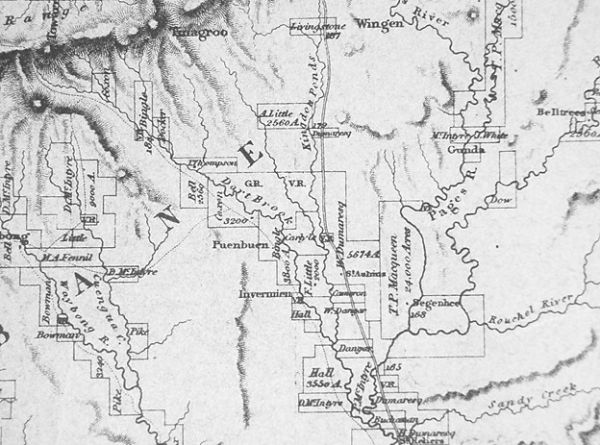Hunter Valley Settlers - Map 9
Click on any of the names on the map or select from the links below to find out more about settlers on this map

Settler Names
John Bingle
Bingle, John Estate Puen Buen
William Bell Carlyle
Carlyle, William Bell No. 34. Granted 2000 acres 30 April 1822. Estate Invermein
Stephen Coxen
Coxen, Stephen Estate Yarundi
Joseph Docker
Docker, Joseph - Arrived on immigrant ship David Scott in 1834
John Dow
Dow, John - Arrived on the ship Warrior in 1830
Mary Anne Fennell
Fennell, Mary Ann Map 9
George Hall
Hall, George No. 147. Granted 3250 acres 15 July 1824. Estate Dartbrook in two portions
Archibald Little
Little, Archibald - Arrived per ship Triton in 1825
Francis Little
Little, Francis No. 66. Granted 2000 acres 30 April 1823. Arrived per ship Morley in 1823
Peter McIntyre
McIntyre, Peter
Hamilton C. Sempill
Sempill, Hamilton C - Arrived per ship Warrior in 1830
James White
White, James Estate Broomfield
An account of
Sir Thomas Livingstone Mitchell 's expedition as they passed through the district in 1831.....
That day they encamped on the Kingdon Brook, where it formed a broad pool deep enough for bathing in, with good grass in the neighbourhood - the ' burning hill' of Wingen distant about four miles. On the 3d they ascended the chain of hills connecting Wingen with Mount Murulla and the Liverpool range; and descending to a beautiful valley of considerable extent, watered by Page's River, they encamped on a fine flat, apparently consisting of a soil of excellent quality, the extremities of the mountains on the north falling in long gradual slopes, well covered with grass, and already eaten short by sheep.
On the 4th their way lay westward towards the head of the valley, in order to cross, by the usual route, the higher and principal range, which still lay to the north - the whole of the valley appearing to consist of good land, and the adjacent mountain affording excellent sheep pasture; and on the 5th they ascended and descended the Liverpool range, which divides the colony from the unexplored country beyond.
' here I at length drank the water of a stream (called by the natives ' Currangai') which flowed into tho unexplored interior; and from a hill near our route this day I beheld, for the first time, the distant blue horizon, exactly resembling that of the ocean.'
The day before, the Major, when riding a little beyond the encampment, had fallen in with a tribe of natives from Pewen Bewen on Dart Brook, one of whom afterwards visited the party, but could tell little about the interior of the country. This tribe had reached Currangai before them, apparently to join some of their friends who lay extremely ill there, being afflicted with a virulent kind of smallpox.
'We found the helpless creatures stretched on their backs beside the water, under the shade of the wattle or mimosa tree, to avoid the intense heat of the sun. We gave them from our stock some medicine, and the wretched sufferers seemed to place the utmost confidence in its efficacy. I had often, indeed, occasion to observe, that, however obtuse in some things, the aborigines seemed to entertain a sort of superstitious belief in the virtues of all kinds of physic. I found that this distressed tribe were also 'strangers in the land' to which they had now resorted. Their meekness, as strangers, and their utter ignorance of the country they were in, was very unusual in natives, and particularly excited our sympathy, when contrasted with the prouder bearing and intelligence of the native of the plain who had undertaken to be my guide.'
On the 6th they continued their journey, crossing low ridges of rich earth, branches from high ranges on their left, and came upon a portion of the plains. The wide expanse of open level country extended in a northerly direction as far as human vision could reach, and, being clear of trees, presented a remarkable contrast to the settled districts of the colony. The soil of these plains looked well, the grass good, and herds of cattle, browsing at a distance, adding pastoral beauty to what had been recently a desert. Leaving the cart track they had been following, and which led to some cattle station, the party again entered the woods, and turned a little to the north, their object being to reach the bank of Peel's River at Wallamoul, which had been laid down as holding a northerly course, and therefore likely to lead to any greater river flowing to the north-west, as reported by 'the Barber.'
Crossing a deep dry bed, called by the natives ' Nazabella,' they encamped near some of its ponds, at a shady spot where the long grass had been burnt, in other parts reaching to the heads of the horses, and remained there another day to recruit - ' the rich soil of the valley being nearly as deep as the bed of the rivulet, which is twenty feet lower than the surface.' 'Dec- 8 - A road or track which we found at about half-a-mile east from the camp, led us very directly on the bearing of 335o to Loder's station, which was distant about six miles from our encampment. Here stood a tolerable house of slabs, with a good garden adjoining, in charge of an old stockman and his equally aged wife. This man was named by the blacks ' Longanay' ( Long Ned). This station was situated on a fine running stream called the Cuerindie - Blackwoods Magazine
↑
